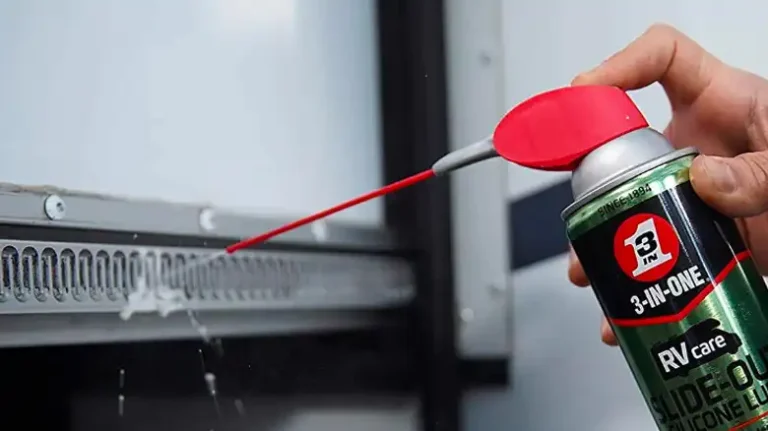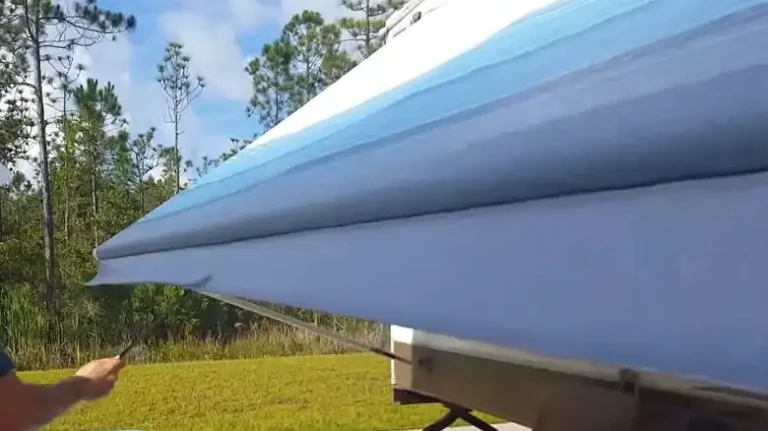RV Propane Safety Tips for Beginners
Propane systems are essential for powering appliances and features that make RVs feel like home on the road. However, propane also introduces an element of fire, explosion, and poisoning risks from leaks or mishandling that RV owners must manage carefully. As a beginner RV owner, understanding propane safety fundamentals will help you operate your RV’s propane system responsibly and take precautions to protect yourself, your passengers, and your investment. So, if you want to get to know about all propane safety measures, take a few minutes and go with this post.

RV Propane Systems
RV propane systems utilize pressurized liquid propane (LPG) stored in portable tanks to supply interior stoves, ovens, furnaces, water heaters, and fireplaces. The system begins with DOT (Department of Transportation) certified ASME tanks mounted to the trailer frame. These rugged high-pressure steel or aluminum tanks contain 20-100 pounds (5-25 gallons) of LPG.
The tank connects via a flexible hose to a two-stage regulator. This component adjusts the high tank pressure of up to 312 psi down to safe, consistent appliance pressures of 11 inches water column (0.4 psi) for low-pressure appliances like refrigerators and stoves or 13 inches water column (0.5 psi) for higher pressure demands of furnaces requiring more propane flow.

From the regulator, copper lines distribute propane through the frame and walls to each appliance where manual valves can shut off flow appliance-by-appliance. Flexible rubber appliance connectors attach the lines to stoves, ovens, etc. Always turn off RV propane tanks while driving or refueling at gas stations to limit risks.
Why Propane Safety is Important?
Though propane powers essential amenities that make RVing comfortable and convenient, it also introduces risks of fire/explosion, poisoning, and suffocation hazards from leaks, poor ventilation, or improper use –
Propane is highly flammable and explosive, especially if leaks accumulate in enclosed spaces and ignite
Invisible, odorless combustion byproducts like carbon monoxide can prove poisonous in cabins
Propane vapor displaces oxygen which leads to suffocation risk in extreme exposure
Practicing propane safety fundamentals helps minimize these dangers –
a) Inspecting routinely for damaged lines, loose fittings causing leaks
b) Testing for leaks properly around connections
c) Maintaining exterior exhaust ventilation for appliance operation
d) Shutting off tanks when not in use
e) Identifying propane scent to aid leak detection
f) Installing LP and CO detectors as backup protection
Ignoring propane safety hazards may result in explosions, CO poisoning, or inadequate oxygen inside for breathing. Prioritize propane system safety every time you RV to protect health and investments.
Propane System Components
Operating your RV’s propane system safely starts with understanding key parts and using them prudently –
Tanks
DOT-certified ASME RV propane tanks have thicker walls and protective cages compared to non-certified tanks more suitable for barbecue grills. Tanks contain 20-100 lbs of propane and connect via the POL tank valve. Always secure tanks upright and oriented to allow vapor to exit. Replace/recertify cylinders every 12 years per law.
Hoses & Lines
The thick flexible rubber Type 1 LPG hose connects the tank to the regulator inlet, while copper lines distribute propane through the RV frame to appliances. Ensure threads connect tightly without leaks. Replace aged, cracked, or damaged hoses/lines according to manufacturer guidance.
Regulators
Two-stage regulators attach to the tank POL valve to lower high tank pressure to safe 0.4-0.5 psi appliance demands. Only use regulators designed for RV propane systems with flow capacities meeting appliance loads. Replace regulators every 5-7 years.
Appliances
Copper lines route propane to each appliance like stoves, heaters, and fireplaces. Appliance valves release propane when activated by thermostats or ignition sequences. Isolate appliances via individual shutoff valves during maintenance. Keep exhaust fans engaged for ventilation.
RV Propane Safety Tips
Practicing consistent propane safety habits ensures your RV system works reliably for years while minimizing fire, health, and explosion risks –
The foundation of safety is regular, thorough inspections of all system components described above. Inspect tanks, valves, fittings, lines, appliance connectors, and controls for cracking, corrosion, kinks, or loose connections annually and before each trip. Have technicians make repairs as needed.
It’s also critical to frequently test for leaks which may develop over time from vibrations or damage. Use an electronic propane leak detector monthly or spray soapy water on all connections and lines watching for bubbles. If leaks persist, shut off the tank valve and contact a technician immediately for repair. Never ignore leaks.
Propane vapors are heavier than air, so leaks tend to pool in enclosed spaces rather than dissipate outside. For safety, always keep an exhaust fan running or windows open when using propane appliances to ventilate properly. Install and routinely test propane and CO alarms that will activate if dangerous gas concentrations accumulate inside.
While in transit, be sure to turn off the main propane valve at the tank. Appliances shouldn’t run while driving both for safety and to conserve fuel. The only way to ensure appliances stay off is by shutting master supply valves. Never transport or store spare propane tanks inside the RV living areas either – keep extras secured on the trailer frame only.
When not camping or living in the RV full-time, turn off the propane master valve. Failing to shut off propane to a stored RV wastes money through slow leaks and causes hazards. Make turning off propane part of your parking checklists along with draining water and disconnecting batteries.
How to Ensure Propane Appliance Safety?
Each propane appliance like stoves, furnaces, and water heater introduce unique risks that conscientious RV owners stay mindful of, especially beginners getting acquainted with how to operate equipment safely –
Before igniting any propane appliance, always test for leaks and ensure adequate ventilation by opening multiple windows first. Never assume appliances function safely without initial and ongoing inspection, maintenance, and leak checks before each use. Operate vent fans whenever possible.
Stand by the first several minutes after activating propane appliances, observing for abnormal issues like persistent gas smells or odd burner colors indicating improper combustion. Shut down appliances immediately if the operation seems unusual and have a qualified propane technician inspect and service the appliance before attempting to use it again. Signs of trouble require investigation.
Never leave cooking food, heating water, or running furnaces unattended for more than a few minutes. Stray debris, control malfunctions, or unexpected flare-ups do occasionally occur. Stay vigilant when leveraging propane power. Keep ABC fire extinguishers and propane/CO detectors handy in case an unexpected hazard escalates out of control. Know how to quickly shut off individual appliances and main propane valves.
Avoid using space heaters, ovens, or stove burners beyond normal appliance loads for auxiliary heat in freezing weather. Extreme demand strains the regulator and risks freeze-ups or combustion issues in appliances. Instead, insulate windows, seal drafts, and dress more warmly inside when camping in cold temperatures.
Above all else, read and follow the safety guidance in your owner’s manuals related to propane system use, care, and maintenance. Understand manufacturer warnings fully before operating appliances and handle propane conscientiously.
What To Do If You Detect Propane?
As propane mercaptan additive emits a strong sulfur/rotten egg scent, the smell often indicates potentially dangerous propane leaks. If you ever smell propane either inside or around your RV –
a) Extinguish cigarettes/flames immediately. Eliminate all ignition sources.
b) Don’t touch electrical devices/appliances to avoid potential sparks.
c) Shut off the propane tank main valve to stop further fuel flow.
d) Open doors and windows widely to ventilate the area.
e) Evacuate everyone from the RV until the leak is repaired.
f) Only allow qualified propane technicians to inspect and repair leaks.
Do not hesitate – evacuate all occupants and call emergency responders if a propane leak causes severe headaches, dizziness, or intensifies instead of dissipating. Always trust your senses – strong propane odor signals potentially grave danger.
Safe Propane Storage & Transport
When not camping with your RV, you’ll need to decide whether to demount and exchange propane tanks or simply shut them off and store them mounted to the RV. Storing propane long-term won’t degrade fuel quality or tank performance significantly. However, cylinders actively dispensing propane full-time only last about 12 years before needing testing/replacement.
Shut-off and stored tanks experience gradual bleed losses through gasket leaks over months. For efficiency, consider removing propane tanks if parking more than a season to avoid wasting fuel. Place cylinders upright and protected from the weather in secure, ventilated outdoor lockers detached from RVs so elements don’t degrade seals and valves.
Before reinstalling stored tanks or exchanging empties for filled replacements, perform thorough reinspections using bubble solution looking for damage or clogs that could hinder flow. Never overfill tanks past safe 80% cylinder volume levels. When transporting spare tanks, connect them via a gauge manifold to equalize pressure across tank cluster combinations.
How To Test for Propane Leaks?
The bubble technique is the most widely available DIY leak testing method. Acquire or make soapy water solution and apply via spray bottle, brush, or rag across tanks, gauges, valves, fittings, lines, appliances, and related propane gear –
- Tank valves, gauge connections
- Regulator inlet/outlet seals
- POL fittings
- Appliance line unions
- Solenoid valves on appliances
Watch propane connection points closely where suds linger. Any leaks will release vapor bubbles through the soapy film. Watch for steady bubbling indicating escaped gas. Mark leak spots and shut off propane valves before attempting repairs.
Electronic combustible gas detectors provide quicker propane and LP gas leak detection without requiring water and perfect vision. Battery-powered detectors contain sensors that react to leaking gas vapors. Digital displays and loud alarms alert users to the gas concentration levels detected for immediate risk awareness.
Homeowners can also utilize specialty combustion gas testing solutions. Applying these liquid chemical leak detector compounds to suspected leakage points triggers thick foam when combined with escaping propane vapors.
How To Fix Propane Leaks?
Before attempting propane leak repairs, always turn off system valves to halt fuel flow. First attempt tightening fittings 1/4 turn with pliers to reseat gaskets before replacing defective parts. Apply thread lubricating paste approved for LPG systems when reconnecting fittings.
If leaks persist from age-expired rubber gaskets or ruptured propane hoses/lines, replace the damaged sections using rugged materials meeting RV propane system codes. Ensure new parts feature the DOT RV LPG compliance etching. Consider having technicians make repairs in hard-to-reach areas.
Serious propane leaks involving stuck open relief valves venting fuel or tanks spewing gas vapor likely require qualified RV service technician assistance. They have specialized leak sealing tools, purge equipment, and component replacements to comprehensively fix tricky leaks beyond typical owner abilities.
Conclusion
Propane equipment undoubtedly enables convenient cabin comforts for recreational vehicle enthusiasts. However, owners must prioritize safety given the power of pressurized combustible gas tanks and appliances. By comprehending system components, implementing prudent operational habits, properly maintaining equipment, and responding appropriately when encountering leaks, RVers can safely enjoy LP gas appliances for years of happy camping.
Related Questions
What are the standard RV propane tank sizes?
Common DOT ASME RV propane tanks hold 20, 30, 40, or 100 lbs (5-25 gallon water capacity) based on density. Two 40s or a single 100 lb cylinder works well for most travel trailers. Class A motorhomes often use two 30 or 40-lb tanks in parallel for higher demand.
How long does propane last stored in tanks?
Sealed propane tanks slowly lose pressure and containments through gasket leaks over time while not dispensing fuel. However, propane liquid itself has an indefinite lifespan. Twelve years marks the DOT requalification interval for RV propane cylinders actively supplying appliances.
How much propane is needed for an RV trip?
Propane consumption varies drastically depending on climate, appliance use frequency, and other factors. However, unless boondocking full time in winter using propane for all lights, heat, and cooking, one 30 lb class C motorhome tank should last most average 1-2 week RV vacations during warmer seasons.







